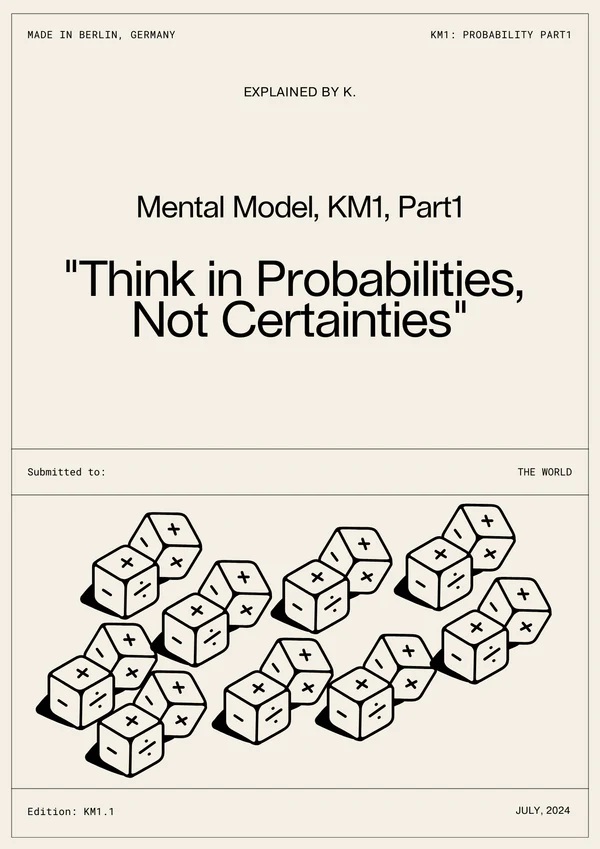[GroupBuy] Philosophy of K – Mental Model Series – Think in Probabilities, Not Certainties
$39.00
Discount 20% if your total cart over $150
- Satisfaction Guaranteed
- Fast and forever download link
- Secure Payments
- Reupload FREE
Description
The Philosophy of K is a transformative framework designed to revolutionize decision-making by prioritizing probabilistic thinking over deterministic certainty. It offers a powerful mental model series, equipping individuals with the tools to navigate complexity and thrive in an unpredictable world. This in-depth exploration delves into the core tenets of this unique approach.
Philosophy of K
The Philosophy of K, or Kenism, as it’s sometimes called, moves beyond the superficial understanding of probability as a mere mathematical calculation. Mr. K, the creator of this system, argues that it is a fundamental way of perceiving and interpreting reality itself. This paradigm shift encourages thinking in terms of probabilities, not certainties, enabling a more nuanced and adaptive response to the challenges of life. The core of Kenism is not about predicting the future with certainty, but about building resilience and strategic advantage in the face of unavoidable uncertainty. It acknowledges the inherent strangeness of a self-moving, indifferent world, urging us to build strategies that not only survive chaos but thrive in it.
The Redefinition of Probability
The cornerstone of the Philosophy of K rests on a profound redefinition of probability. It’s not simply about calculating odds; instead, it’s about cultivating a perceptual shift—a way of seeing the world in terms of likelihoods and possibilities. This involves acknowledging that our understanding is always incomplete, that uncertainty is inherent to existence, and that accepting this fact is the first step toward mastering it. Instead of fearing or ignoring uncertainty, Kenism embraces it as a fundamental aspect of reality, offering a framework to navigate it successfully.
This foundational shift in perspective allows for a more flexible mode of thinking. Where traditional approaches often rely on rigid plans and certainties, Kenism prepares for a range of outcomes, thus creating resilience to unexpected events. This resilience doesn’t stem from trying to predict the unpredictable, but from structuring one’s life, decisions, and systems to weather volatility and make appropriate course corrections.
The shift in focus is from a deterministic approach—one where cause directly precedes effect in a predictable manner—to a probabilistic one, where multiple interacting factors influence outcomes resulting in a variety of possible futures. The Philosophy of K, in essence, facilitates seeing not only the most likely future but the broader spectrum of possibilities, thereby allowing for a more nuanced decision-making process.
The Impact of Unseen Patterns
The Philosophy of K emphasizes the critical role of understanding unseen patterns in shaping outcomes. Many decisions are driven by biases and illusions of risk which often conceal the underlying probabilities. By honing the ability to perceive these patterns, one can significantly improve decision-making across life’s myriad domains. This ability involves moving past superficial correlations, delving deeper into the system dynamics to discern causality, and developing a sensitivity to the subtle ways context and interconnections shape the probabilities of success or failure.
This involves developing a kind of “probabilistic intuition,” a deeper understanding of underlying patterns that cannot be simply reduced to mathematical calculations. It is an intuitive sense of the landscape of possibilities, informed by but not confined to, formalized probability principles. This intuition is cultivated through dedicated practice and mindful observation, allowing one to discern underlying structures even in seemingly chaotic or random environments.
It is essential here to recognize that this ‘seeing’ is not an act of clairvoyance. The patterns aren’t revealed through mystical means, but through deliberate study, rigorous analysis, continuous feedback loops, and a clear understanding of the limitations of one’s own knowledge.
Building Resilience through Structural Understanding
A central aim of the Philosophy of K is the development of mental resilience. This mental fortitude is not built from ignoring difficult truths, but from embracing uncertainty, learning from pain, and constantly recalibrating our understanding of reality. The system recognizes that the only constant is change. Therefore, the ability to adapt and learn proactively is crucial.
Kenism advocates for constructing mental models that transcend simplistic cause-and-effect relationships. It suggests moving beyond superficial explanations, recognizing the complex interplay of various influences. This involves understanding feedback loops, nonlinear dynamics, and unexpected consequences that can arise from even seemingly minor actions. By considering the full scope of influence, the approach helps prepare for, and often mitigate, the potential impact of unpredictable changes.
The Philosophy of K ultimately aims to create an adaptive and stable foundation — a bedrock of understanding — from which one can face whatever the world throws. It promotes a philosophy of resilience, not through wishful thinking, but through a hard-won understanding of the world’s complex and often brutal realities.
Mental Model Series
The Philosophy of K is not simply an abstract philosophical framework; it is a practical system implemented through a structured Mental Model Series. This series serves as a practical guide, providing specific tools and techniques to implement the probabilistic thinking described above. It systematically approaches the challenge of navigating uncertainty, moving through stages from fundamental concepts to advanced strategic applications. Each part builds upon the previous one, creating a holistic approach to developing strategic acumen.
Mastering Probabilistic Reasoning
The Mental Model Series starts by establishing a solid foundation in probabilistic reasoning. It’s about moving away from binary thinking (right or wrong, success or failure) to a nuanced view that embraces the spectrum of possible outcomes. This includes actively working against cognitive biases such as confirmation bias, anchoring bias, and the availability heuristic, which distort our perception of probabilities and lead to suboptimal decisions. The series teaches how to identify these biases and develop strategies to mitigate their influence.
It emphasizes actively seeking out and incorporating diverse perspectives, rigorously testing assumptions, and updating beliefs based on new evidence. This dynamic interplay between existing knowledge and incoming information allows for a continuous learning cycle that adapts to the dynamic nature of reality. The series equips learners with the means to structure their thinking about uncertainty, helping them approach complex situations with greater clarity and confidence.
The practical application of these tools involves creating models and frameworks to visualize potential situations and analyze possible outcomes, rather than relying on instinctive or purely emotional responses.
Embracing Uncertainty and Managing Chaos
A critical component of the Mental Model Series is learning to manage the emotional impact of uncertainty and chaos. The series highlights cognitive biases that hinder our ability to remain calm and make rational decisions during stressful periods. This involves developing strategies for filtering out irrelevant information, slowing down our reaction times to avoid impulsive decisions, and utilizing structured problem-solving methods to tackle complex situations step-by-step.
The incorporation of techniques from mindfulness and stress management helps individuals develop emotional resilience in the face of uncertainty. It encourages learners to recognize that the emotional response to uncertainty can be managed, rather than dictated by it, and cultivates the ability to perceive and act in high-pressure situations with calm and clear-headed judgment.
This component emphasizes the importance of developing a calm, deliberative mindset and applying structured thinking systems. It is not about avoiding difficult situations, but rather about developing the mental resources to manage the emotional turbulence as part of a strategic engagement with unpredictable situations.
Applying Bayesian Thinking and the Black Swan Theory
The Mental Model Series introduces the application of Bayesian thinking as a continuous process of updating beliefs based on new information. This is crucial for dealing with the inherent uncertainty within a probabilistic framework. By recognizing the temporary nature of knowledge, one is able to refine actions and strategies as new data emerges, constantly improving the probability of achieving desired outcomes.
The series integrates the Black Swan Theory, acknowledging the possibility and impact of highly improbable events. It doesn’t focus on predicting these events but rather on creating robust strategies that can absorb unexpected shocks and maintain stability in the face of unforeseen circumstances. This emphasis on resilience and adaptability serves as an important counterpoint to deterministic approaches that falter when faced with the unpredictable.
Within the series, the integration of Bayesian thinking and the Black Swan Theory illustrates how to build systems that tolerate, and even benefit from, unpredictable events instead of collapsing under their weight.
Think in Probabilities
The core principle of the Philosophy of K is the imperative to “Think in Probabilities, Not Certainties.” This simple yet profound change in mindset shifts our perspective from a rigid, deterministic view of the world to one that embraces nuance, possibility, and the inherent unpredictability of reality. It provides a framework for dealing with the inherent uncertainty and ambiguity which defines our existence.
Probability as Perception: A Transformational Shift
At the heart of this philosophy lies a redefinition of probability itself. The Philosophy of K moves beyond the mere mathematical calculation of odds, emphasizing instead the development of a probabilistic way of seeing the world. This requires developing the skill to intuitively gauge probabilities based on context, patterns, and the overall understanding of a situation. It’s not just about calculating outcomes; it’s about developing an intuitive feel for the likelihood of different possibilities.
This paradigm shift is crucial for effective decision-making because our perception of the world is frequently clouded by biases, limited information, and heuristic shortcuts. The Philosophy of K provides the tools to identify and correct for these distortions, leading to more accurate estimations of probabilities. This improved probabilistic reasoning enables not only improved decisions but also makes decision-making a more rational and less anxiety-inducing process.
Such a fundamental change in perception requires conscious effort and dedicated practice. However, it offers a critical advantage over simpler, overly confident methodologies.
The Power of Probabilistic Thinking in Decision-Making
The ability to “Think in Probabilities, Not Certainties” is a powerful tool applicable to various aspects of life. In personal relationships, it helps us navigate complex social dynamics by understanding the varied motivations and intentions of others. This fosters constructive communication, more effective conflict resolution, and improves the overall quality of interpersonal interactions. This also allows for strategic flexibility, enabling more constructive negotiation strategies. In the financial markets, it informs better investment decisions through analyzing potential risks and rewards, hedging against uncertainties, and managing overall portfolios more effectively.
In professional settings, this method allows for the development of more robust strategic plans, adaptable to changing circumstances. Leaders trained in this manner can make better informed decisions in high-pressure situations, anticipate potential challenges, and create solutions that are more resistant to unexpected pitfalls. This is because the focus shifts from striving for perfect knowledge to designing strategies that can thrive despite imperfections.
This ability to effectively utilize probabilistic reasoning translates into more effective responses in a wider range of situations and is not merely limited to business or personal finance.
Applying the Philosophy to Everyday Life
The application of “Thinking in Probabilities, Not Certainties” extends beyond strategic planning and major decisions. It can be integrated into everyday life for improved interactions. Consider, for example, the act of driving. Someone employing a deterministic approach might overestimate their driving skills and underestimate the likelihood of unpredictable events, such as an abrupt stop by another driver, or changes in weather. However, someone adept at probabilistic thinking will consciously maintain a greater margin of error, increasing safety and avoiding potential accidents.
Similarly, in social interactions, one might assume a certain outcome, say, a meeting being conducted productively. Instead, a probabilistic viewpoint would take into account various possible outcomes, allowing for greater flexibility and potentially avoiding significant disappointments. This kind of proactive adaptation is inherent to successfully incorporating probabilistic thinking into daily life.
In all cases, it is not a prediction of the future, but a preparation for a range of potential outcomes, that provides the greatest benefit.
Not Certainties
The Philosophy of K explicitly rejects the pursuit of absolute certainty. It acknowledges that certainty, in many aspects of life, is an illusion. This understanding forms the foundation for a more practical and effective approach to decision-making and strategy. By embracing uncertainty rather than striving to eliminate it, we open ourselves to a broader range of possibilities and can create more robust, adaptable systems.
The Illusion of Certainty
The human mind exhibits a strong preference for certainty, even when it’s demonstrably unavailable. This bias leads us to make decisions based on incomplete or inaccurate information, clinging to illusions of control and predictability. The Philosophy of K challenges this tendency, encouraging a shift towards a more realistic assessment of the world. Instead of seeking absolute certainty, it advocates for a more nuanced understanding of probabilities and the likelihoods of different outcomes.
This acceptance of uncertainty is not a sign of weakness or resignation but a reflection of a mature intellectual stance. By acknowledging the limitations of our knowledge, we become more receptive to new information and adapt more effectively to changes.
This process creates a more realistic and resilient approach to navigating life’s complexities – an approach that acknowledges uncertainty not as an obstacle to overcome, but as an inherent aspect of reality to be understood and worked with.
Building Resilient Strategies in an Uncertain World
The rejection of certainty doesn’t lead to paralysis; instead, it drives the creation of more resilient strategies. A system built on the assumption of absolute certainty invariably crumbles when faced with unexpected events. However, a system that operates within a probabilistic framework – one that explicitly accounts for various possibilities and uncertainties – can better adapt to unforeseen circumstances.
This doesn’t mean foregoing planning or preparation; rather, it implies designing strategies that are adaptive and robust enough to withstand shocks and unexpected changes in market or life dynamics. These strategies allow for course correction based on new information, ensuring that the overall goal is pursued even when specific paths are disrupted.
Instead of focusing on a single, perfect prediction of the future, this approach focuses on building numerous flexible contingency plans. This adaptability, this ability to effectively pivot, is the core strength of a system built on probabilistic reasoning, which inherently anticipates change and flexibility.
Acceptance and Adaptability as Key Strengths
Central to the Philosophy of K, and the idea of “Not Certainties,” is the realization that accepting uncertainty is not weakness but strength. Those who cling too tightly to certainties often are unprepared for events beyond their assumptions, demonstrating a form of strategic blindness. But, those operating within probabilistic frameworks are better equipped to adapt to changing conditions, often thriving in environments others struggle to navigate.
This mindset creates resilience at both the individual and systemic level. At the individual level, accepting uncertainty frees one from the anxiety of striving for an impossible ideal. At the systemic level, it generates flexible organizations and businesses that can respond effectively in the face of unexpected challenges. These adaptable systems, capable of constant recalibration in response to novel information, become far more robust in the long term.
It is this adaptability, this capacity to constantly learn and adjust, that defines the strength of the Philosophy of K.
Conclusion
The Philosophy of K represents a powerful, practical, and transformative approach to decision-making, strategy, and understanding of reality itself. By shifting from deterministic certainty to embracing probabilistic thinking, it equips individuals with a robust mental model series that fosters strategic acumen, adaptability, and resilience. The core principle of “Thinking in Probabilities, Not Certainties” encourages a fundamental shift in perspective, enabling superior navigation of uncertainty and a more profound understanding of the world’s inherent complexities. This system not only prepares for various realities but also enables one to actively shape their future in a fundamentally unpredictable world.
Sales Page:_https://philosophyofk.com/products/mental-model-km1-part1-think-in-probabilities-not-certainties-book
Delivery time: 12 -24hrs after paid






 Chris Rempel – B2B Matchmaking-Special Report
Chris Rempel – B2B Matchmaking-Special Report